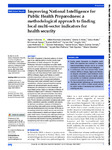Improving National Intelligence for Public Health Preparedness: a methodological approach to finding local multi-sector indicators for health security
Erondu, Ngozi A
Rahman-Shepherd, Afifah
Khan, Mishal S
Abate, Ebba
Agogo, Emmanuel
Belfroid, Evelien
Dar, Osman
Hollmann, Lara
Fehr, Angela
Ihekweazu, Chikwe
Ikram, Aamer
Iversen, Bjorn Gunnar
Mirkuzie, Alemnesh H
Rathore, Tayyab Razi
Squires, Neil
Okereke, Ebere
The COVID-19 epidemic is the latest evidence of critical gaps in our collective ability to monitor country-level preparedness for health emergencies. The global frameworks that exist to strengthen core public health capacities lack coverage of several preparedness domains and do not provide mechanisms to interface with local intelligence. We designed and piloted a process, in collaboration with three National Public Health Institutes (NPHIs) in Ethiopia, Nigeria and Pakistan, to identify potential preparedness indicators that exist in a myriad of frameworks and tools in varying local institutions. Following a desk-based systematic search and expert consultations, indicators were extracted from existing national and subnational health security-relevant frameworks and prioritised in a multi-stakeholder two-round Delphi process. Eighty-six indicators in Ethiopia, 87 indicators in Nigeria and 51 indicators in Pakistan were assessed to be valid, relevant and feasible. From these, 14–16 indicators were prioritised in each of the three countries for consideration in monitoring and evaluation tools. Priority indicators consistently included private sector metrics, subnational capacities, availability and capacity for electronic surveillance, measures of timeliness for routine reporting, data quality scores and data related to internally displaced persons and returnees. NPHIs play an increasingly central role in health security and must have access to data needed to identify and respond rapidly to public health threats. Collecting and collating local sources of information may prove essential to addressing gaps; it is a necessary step towards improving preparedness and strengthening international health regulations compliance.

